
- Jul 24, 2024
- 12 min read
Is Java Still Relevant in Today's Development Landscape?
On Startups
Custom Software Development

Vitalii Samofal
CTO
In our previous article, we discussed how to choose a tech stack for your project. Now, we will take a deep dive into the world of Java. We will discuss:
– Why Java is so popular,
– Top uses of Java,
– The latest Java trends
– The future of Java, etc
A Brief History of Java: When Was Java Developed and How?
Let’s start with a short history overview. So, who created Java? Java was developed by a team of experts. Their leader was James Gosling. Other prominent members included Mike Sheridan and Patrick Naughton. Gosling’s team were employees of Sun Microsystems. This was a large tech company, selling computers and software. In 2010 Oracle bought Sun Microsystems for 7.4 billion USD.
Now, let’s discuss why and how Java was developed. The initial goal was to develop a programming language for consumer electronics like smart TVs and set-top boxes. The team had several criteria. First, they wanted the language to be simple and feel familiar to developers. So, they used the syntaxes of the C and C++ languages as a basis for the new language. Second, the language had to be reliable. Third, it had to be portable across devices. This means that the same code can be deployed on various devices with different operating systems without the need for alterations.
But, the 1990s saw the rise of the Internet. And the priorities of the Java development team changed. They saw the potential of Java for server-side web development. It was much more suitable for web dev compared to existing languages, like C++, SHTML, or Perl. Here are several reasons why:
- Simplicity
Java is more straightforward than C++ or Perl. So, it was a good choice, considering the dynamic nature of rapidly developing web tech.
- Portability
Java is platform-independent. It reflects a principle called WORA – Write Once, Run Anywhere. This means that Java apps can run on any device with any operating system as long as it has a JVM (Java virtual machine). Portability is important for several reasons. Cross-platform compatibility reduces development time and cost. It also enhances the flexibility and scalability of web apps. Plus, it simplifies maintenance and promotes platform independence.
- Security
Java has many built-in security features. This made it perfect for handling sensitive data. The security features include bytecode verification, access control, code signing, etc.
- Scalability
Java’s overall architecture is conducive to app scalability. Reasons include the platform independence and the support for object-oriented programming. Plus, the language has various features that further promote scalability. Examples are multithreading and automatic memory management (garbage collection).
Is Java Going Away? Is Java dead? Exploring Today’s Programming Landscape
Next year Java will turn 30. This makes many people wonder – is Java still relevant? To answer this question, let us explore Java’s popularity over the years. Then, we will discuss the popularity of Java today, compared to other programming languages.
Java’s use skyrocketed in the late 1990s – early 2000s. And it has been among the most popular languages ever since. Let's look at statistics. Each institution that measures the popularity of Java and other programming languages uses different criteria, so results slightly differ. The PYPL index tracks the usage of Java and other languages since 2004. Look at the picture below.
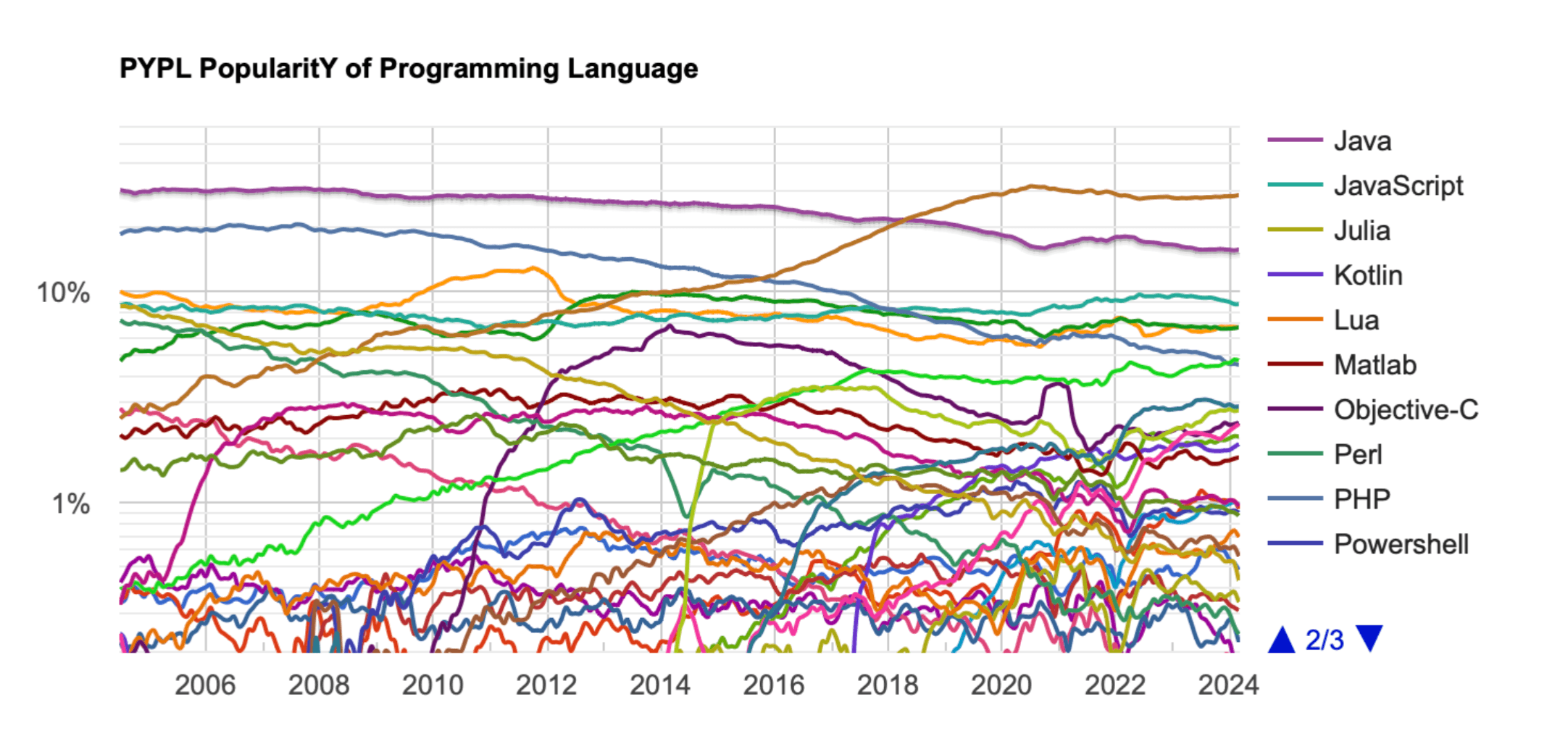
Source: PYPL
As you can see, according to PYPL, Java was the most popular language between 2004 and 2018. For most of this time, the second place belonged to PHP. Yet, the popularity of Python was growing fast. In October 2015 it took PHP's place as the second most popular language. And, in April 2018, it became more widely used than Java. That being said, Java remains the second most popular programming language.
Other resources show a similar picture. GitHub has tracked language popularity since 2014. It claims that JavaScript was and still is the most popular language. Java was the second most used up until the middle of 2018 when Python took its place. In 2022, Typescript became third on the list. Today, Java is the 4th on the list.
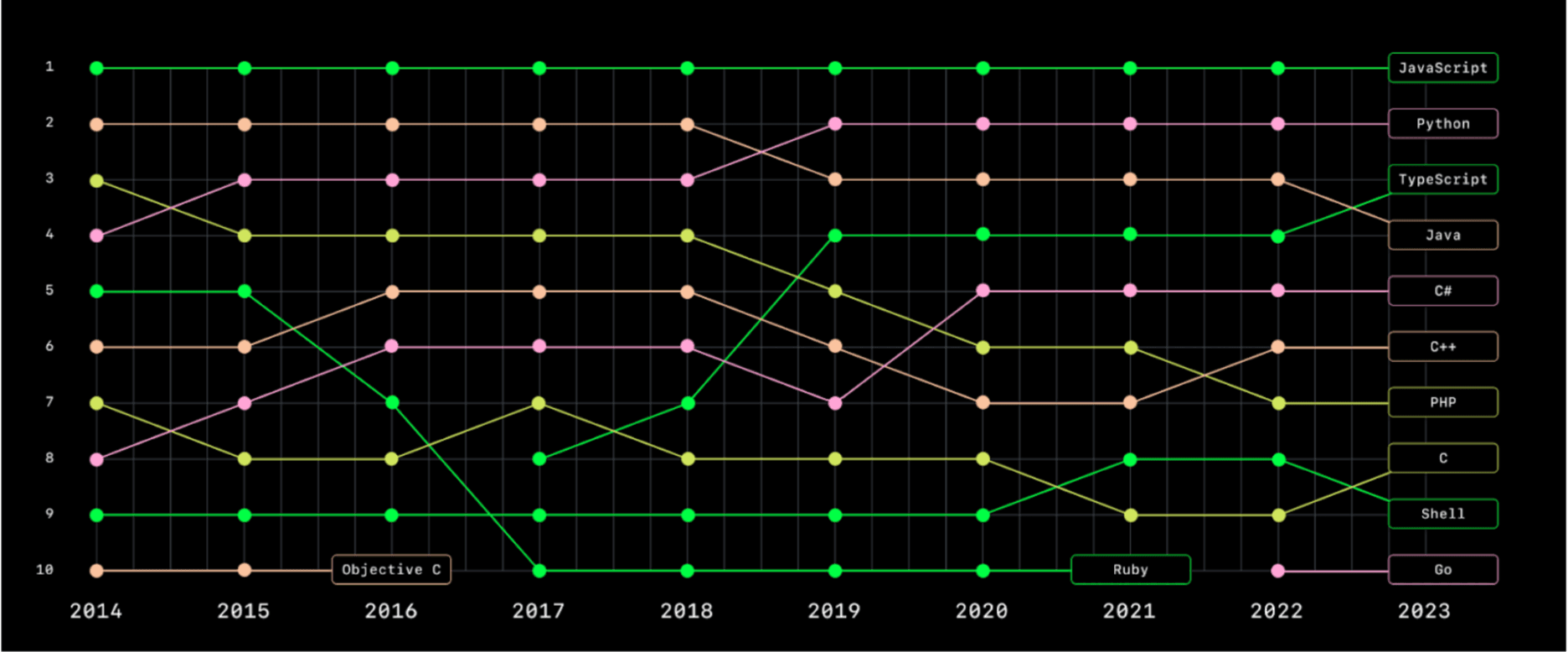
Source: GitHub
There is a difference between ratings because PYPL and Github use mismatched metrics. PYPL tracks the amount of language tutorials searched online, via Google. Github assesses how often developers use certain languages on their platform.
This graph, however, shows that Java language popularity is slowly declining. So, is Java a dying language? Not quite. First of all, JavaScript and TypeScript are mostly used for front-end development. They don’t have many alternatives, so their popularity is high. Java has a different purpose. It is used for creating the back end of large, enterprise applications with complex logic.
Either way, Java has been and remains one of the most popular programming languages in the world. Therefore, if you are wondering whether Java is dead, the answer is no.
Why is Java so Popular? Is Java a good language? Reasons Why Businesses Keep Choosing Java
Now let’s discuss the top reasons why Java is popular:
1. Perfect for complex apps
Java is uniquely suited for building complex large enterprise apps. There are several reasons why Java is better for such purposes than other languages. First, Java promotes object-oriented programming (OOP). This is a programming paradigm that allows developers to organize code into reusable blocks. OOP makes complex applications easier to understand, maintain, and modify.
Platform independence is another reason. Apps made with Java can run on Windows, Mac, Linux, or any other platform that has a JVM. It is easy and saves development time and costs.
2. Large talent pool
Java’s popularity translates to a vast pool of skilled developers. This means that a business can quite easily find qualified coders to create applications based on Java. Recruiting is fast and you will pay a fair price. This is a huge advantage of Java, compared to less established languages, like Golang.
A large and active Java community also ensures support. There are a lot of forums, tutorials and other resources that coders can use whenever they face development issues.
3. Rich ecosystem of tools
Companies that use Java benefit from a vast ecosystem of tools. This includes various frameworks, libraries and development software. For example, a popular Java framework, called Spring, has over 20 extensions with additional functionality.
4. Updates and maintenance is easy
One of the reasons why Java is used for complex apps is the ease of maintenance and updates. As mentioned, Java is an object-oriented language. It promotes code reusability and modularity. Developers organize code into well-defined classes with specific functionalities. This allows coders to update only a particular class. Then, the impact on other parts of the program is minimal.
Garbage collection simplifies maintenance even further. It automatically frees up unused memory.
5. Excellent performance
Java code is compiled into bytecode. The JVM then translates this bytecode into machine code. The code is optimized based on the system's capabilities, improving performance. Simplicity and various scalability features also contribute to Java’s efficiency. This is why Java is important for apps that need high performance.
6. Secure and versatile
Why is Java important for apps that need high security and data protection? There are several reasons. As mentioned, when Java was developed, the Internet was rapidly growing in popularity. The nature of the Internet raises security concerns. So, it was at the forefront of Java developers’ minds. They included many security features, like sandboxing and bytecode verification.
7. Simple integrations
Is Java a good programming language if you need lots of integrations? Definitely! Its standard library provides code samples for common integration tasks like networking (sockets, HTTP) or data serialization.
What Companies Use Java?
Who uses Java? Massive companies using Java include:
- Google,
- YouTube,
- Spotify,
- Amazon,
- Facebook
- eBay,
- LinkedIn
- and Netflix.
This is not a full list. Keep in mind that many large service providers use multiple languages to build and support their products.
Top Java Use Cases: What Can You Do with Java Programming?
Java is incredibly versatile and robust. Applications of Java abound. No wonder the language found widespread adoption across various domains. So what is Java good for? In this chapter, we will discuss:
- Top applications of Java,
- What Java programming can do,
- and why Java is used in various development fields.
The most popular uses of Java are:
1. Web apps, SaaS and cloud software
Web applications are software that runs in a browser. Users access it through the internet. Is Java used in web development? Absolutely! Web apps have two components – the front end and the back end. Developers use Javascript and Typescript for the front end. But Java is very popular for the back end.
Web apps intersect with many other software types. For example, SaaS apps are usually web-based.
Similarly, cloud apps are those that run on virtual servers. They are accessed over the Internet. Often, they use the browser interface, but not necessarily. Coders often use Java programming for cloud computing.
You might wonder – why is Java used for all these software types? Well, they typically have many clients and high traffic. So, Java’s high performance and scalability are a perfect match. Applications made with Java are also easy to update and maintain. The language is
Then, is Java the best programming language for every SaaS web or cloud app? Not necessarily. It depends on project needs, requirements and priorities. For example, if you are using Azure Cloud or other Microsoft technologies, C# might be a better choice. Apps written in Java also take longer to develop compared to some alternatives. You can learn more in our previous article.
That being said, there are some realms in which Java’s importance cannot be overestimated. Those include various enterprise apps and financial systems.
2. Mobile apps
What can you do with Java when it comes to mobile dev? As you know, there are two main mobile operating systems – iOS and Android. Developers use Java or Kotlin to create apps for Android. Nowadays, Android developers at Google advise coders to use Kotlin. But Java is still popular. It’s worth noting that the two languages are very similar. Any developer that knows Java, can learn Kotlin fast and easily. Plus, Kotlin is fully interoperable with Java. So, an app can use both languages. Kotlin developers can also use existing Java libraries and frameworks.
3. Desktop software
Java is widely used for developing cross-platform desktop applications. With libraries like Swing and JavaFX, developers can create graphical user interfaces (GUIs). They are platform-independent and run on any operating system that supports Java. Plus, Java has a rich ecosystem of tools and frameworks. All of this explains why Java is popular for desktop software development.
Desktop applications built with Java include a wide range of software, from productivity tools to multimedia apps and games.
4. Embedded systems
Java ME (Micro Edition) allows developers to create Java applications tailored for embedded devices such as microcontrollers, sensors, mobile phones, and printers. Java ME, developed by Oracle, is a comprehensive ecosystem of tools. it includes several elements:
- Oracle Java ME Embedded,
- Java ME Software Development Kit (SDK),
- Oracle Java ME Embedded Client,
- Java for mobile
- Java TV and Oracle Java Platform Integrator.

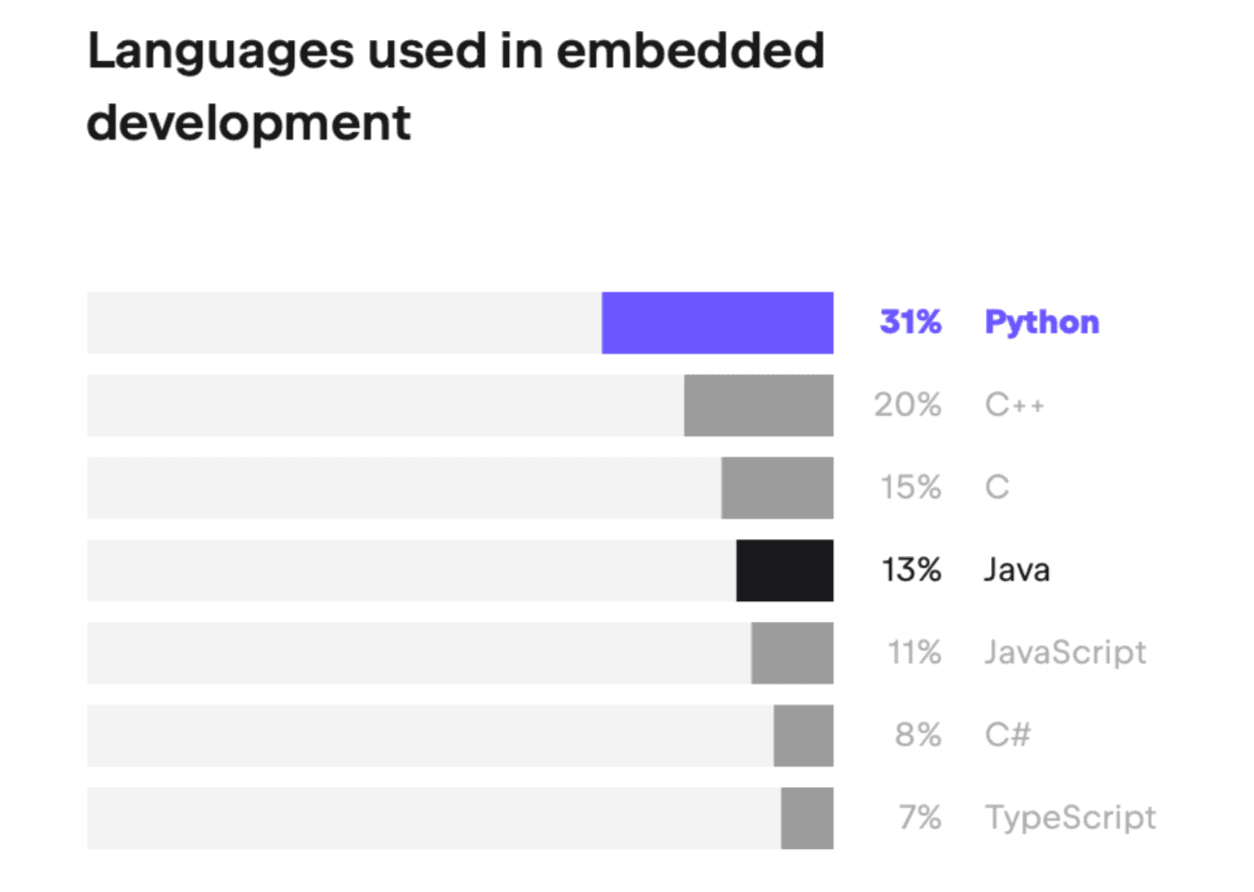
Source: JetBrains
5. Big Data technologies
Why use Java for Big Data solutions? Data engineers need to process and analyze large volumes of data efficiently. Java's concurrency features, garbage collection and built-in networking libraries come in handy. Hence, many popular Big Data applications were developed using Java. Examples include Apache Hadoop, Apache Spark, Apache Kafka, Deeplearning4j and JFreechart.
Overall, Java plays a significant role in Big Data technologies due to its scalability, performance, and extensive ecosystem. Plus, Java is compatible with cloud computing platforms. This makes it well-suited for building distributed systems for Big Data processing.
Other languages popular for Big Data management are Python, R and SQL.
Interesting Facts about Java
Here are 3 fun facts about the Java programming language:
1. The original name was Oak
As mentioned Java was developed by James Gosling and his team. Outside Gosling’s office was growing a beautiful oak tree. At first, he decided to name the language oak, after the tree. Later the name was changed to Java. Interestingly, the name Java is after Java coffee beans, not the island itself.
2. Duke, the Mascot
Java has a mascot, known as Duke. This adorable cartoon character was created during the early days of language development. Its creator was the team's talented graphic artist, Joe Palrang. Interestingly, Joe Palrang went on to contribute his skills to popular animated movies such as Shrek, Flushed Away, and Over the Hedge.
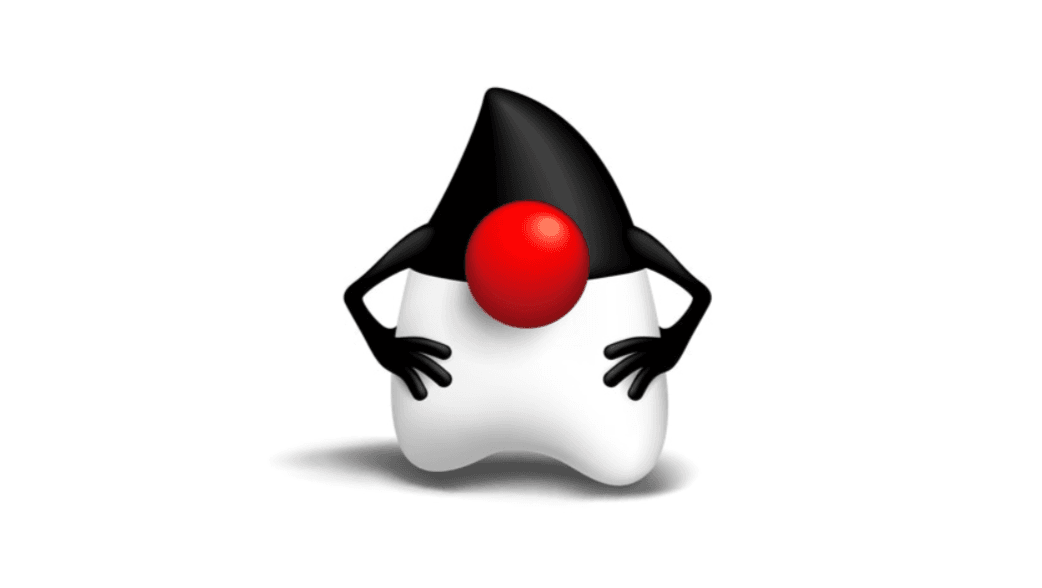
Source: Oracle
3. Java’s birthday
As mentioned, Java was officially released on the 23rd of May, 1995. So, next year, Java is turning 30! In 2020, Oracle celebrated Java’s 25-year anniversary. They released a number of fascinating materials describing Java’s impact on the world. We expect the 30th celebration to bring new exciting insights.
Java Today: Trends, New Tech and Innovation
What can you do with the Java programming language, nowadays? Let’s discuss the language’s modern trends.
Trending Java use cases: What is Java used for today?
There are several trending use cases for Java:
1. Cloud computing
Cloud computing is on the rise. And Java is well-suited for cloud-native and cloud-based software. Applications written in Java are resilient and scalable.
Microservice architecture is very popular for cloud apps. So, is Java programming useful for microservices? According to JetBrains, Java is the most popular language for microservice development. It is followed by JavaScript and Python.
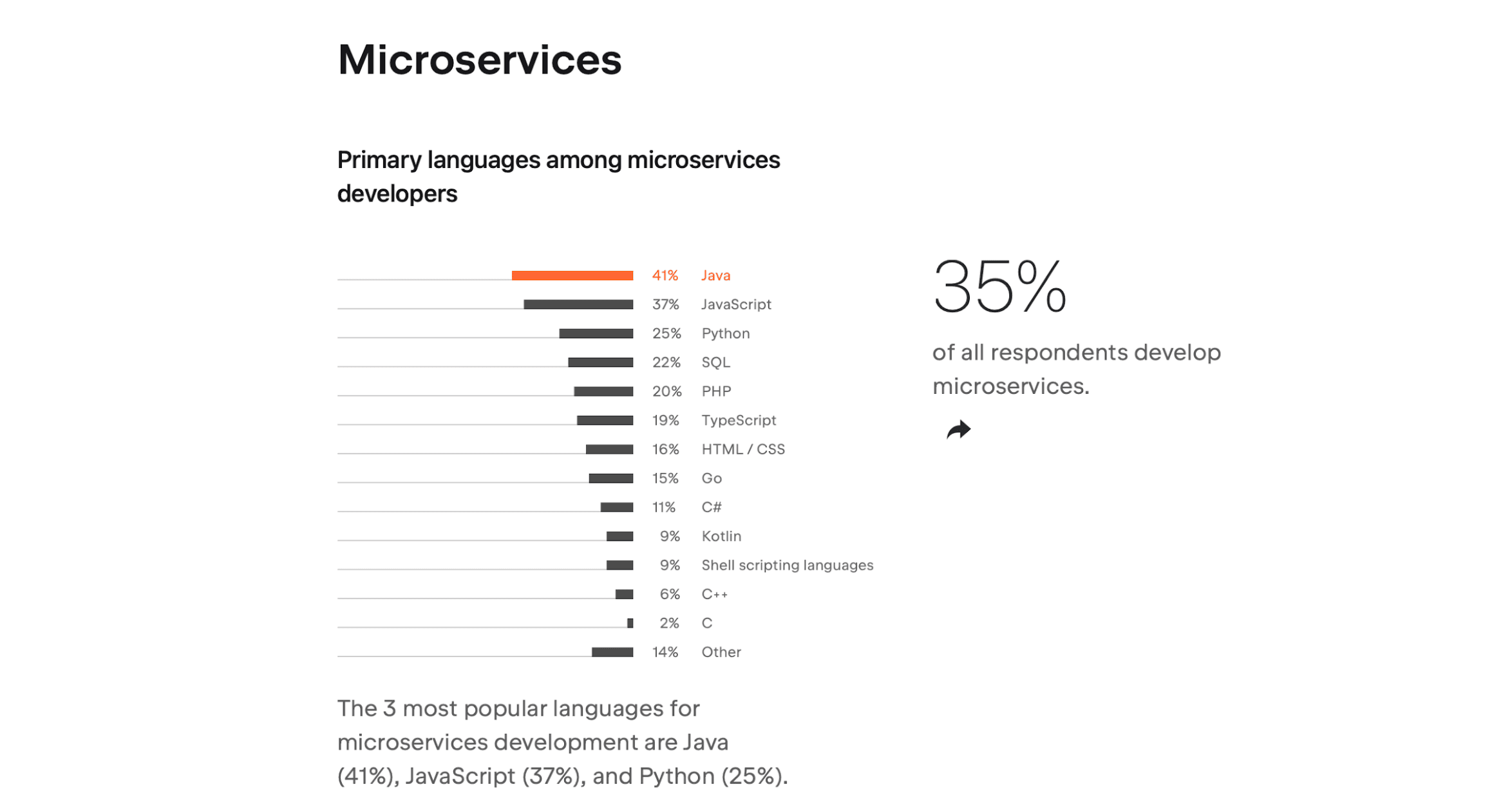
Source: JetBrain
2. AI and Machine Learning
AI and ML are growing in significance by the day. Java’s great performance and scalability make it a good choice for such development. Plus, Java has a mature ecosystem of tools that speed up AI and ML development. Examples include Weka, Deeplearning4j, and Neuroph. All of this makes Java a good choice for building scalable and production-ready solutions. But, we must mention that Python is more popular for AI and ML compared to Java.
3. Big Data
As mentioned, Big Data is one of the top use cases for Java. Big Data continuously brings more value to businesses. This puts it among the hottest Java usage trends.
Java’s latest technologies and tools
The language keeps evolving at an unprecedented speed. New language versions and tools emerge, helping developers be more efficient.
1. Java 17 is the new norm
In 2018, Oracle switched Java to a 6-month release cycle. It means that they present updates every 6 months now. Previously, it was once every couple of years.
Java versions are of two types – non-LTS and LTS (Long-Term Support). Businesses typically prefer using LTS versions. As of now, LTS versions are Java 8, Java 11, Java 17 and Java 21. The latest Java technology version was released in September 2023. Updating software to a new version is not an easy process. In some cases, it can take years. So, most companies now are updating their software to Java 17.
2. Spring Framework 6.0
Another recent technology in the Java world is Spring Framework 6.0. This is the update to Java’s by far most popular framework. It included several major changes. First, it can only be used with Java 17 or later versions. Second, it provides support for the latest tools, including persistence providers (e.g. Hibernate ORM 6.1) and web containers (e.g. Tomcat 10.1). Third, it promotes the Jakarta EE 9+ standards. The latter is a valuable tool for enterprise applications written in Java.
3. AI assistants
Developers use AI assistants to study, create texts and code, find bugs, etc. The most popular AI tools are ChatGPT and GitHub Copilot. It is reasonable to assume that the trend will continue.
The future of Java
Predicting the future is challenging. Still, it is safe to assume that we will see a more widespread adoption of the latest Java technology. This includes Java's 21st version.
Other established and latest Java technologies that will keep getting more popular are:
– containerization,
– cloud apps,
– using Java for IoT, and
– microservice architecture.
We will also see the continued emphasis on security measures.
Conclusion
Let’s summarize. Is Java dying? Not at all. According to some stats, there was a minor decline in popularity. But Java remains one of the 5 most popular programming languages in the world. Not only is Java still used, but it is as relevant as ever.
Java is perfect for:
– large, complex apps,
– web apps,
– cloud-based software,
– mobile apps,
– desktop software,
– embedded systems,
– Big Data tools and more.
Several qualities make Java so popular. These are:
– scalability,
– simplicity,
– ease of maintenance,
– platform independence,
– security, and
– a mature ecosystem of tools.
FAQ
1. Is Java popular in 2024? Is Java used anymore?
Yes, it is one of the 5 most popular programming languages.
2. What is Java used for today?
Lots of things, like web and mobile apps, embedded dev, Big Data, etc.
3. What businesses use Java? What companies use Java?
Companies that use Java include Spotify, Amazon, X and much more.
4. What technologies might replace Java in the future?
Python is getting more popular. But it is unlikely to completely replace Java. Java is better suited for many types of software.
5. Is Java a good language to learn?
Yes, Java is a good language to learn. There is a high demand for it and it’s relatively easy to learn.
6. Is Java a backend language?
Yes, Java is used for back-end (server-side) development.
Subscribe to our blog
Fill out the form below to receive a free consultation and find out how Softkit can help your business grow.